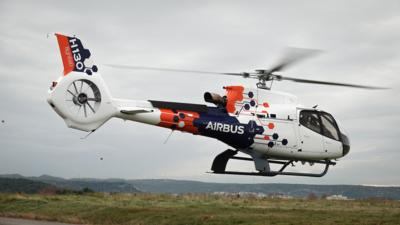Sat, Jan 23, 2021
Will Pursue The Testing Of Hybrid And Electric Propulsion Technologies
Airbus Helicopters has started in-flight tests on board its Flightlab, a platform-agnostic flying laboratory exclusively dedicated to maturing new technologies. Airbus Helicopters’ Flightlab provides a test bed to quickly test technologies that could later equip Airbus’ current helicopter range, and even more disruptive ones for future fixed-wing aircraft or (e)VTOL platforms.

Airbus Helicopters intends to pursue the testing of hybrid and electric propulsion technologies with its Flightlab demonstrator, as well as exploring autonomy, and other technologies aimed at reducing helicopter sound levels or improving maintenance and flight safety.
“Investing in the future remains essential, even in times of crisis, especially when those innovations bring added value to our customers by targeting increased safety, reduced pilot workload, and reduced sound levels,” said Bruno Even, Airbus Helicopters CEO. “Having a dedicated platform to test these new technologies brings the future of flight a step closer and is a clear reflection of our priorities at Airbus Helicopters,” he added.
Flight tests started last April when the demonstrator was used to measure helicopter sound levels in urban areas and to particularly study how buildings may affect people’s perception. First results show that buildings play an important role in masking or amplifying sound levels and these studies will be instrumental when the time comes for sound modelling and regulation setting, especially for Urban Air Mobility (UAM) initiatives. Testing was pursued in December to evaluate the Rotor Strike Alerting System (RSAS) aimed at alerting crews about the imminent risk of collision with the main and tail rotors.
Tests this year will include an image-detection solution with cameras to enable low altitude navigation, the viability of a dedicated Health and Usage Monitoring System (HUMS) for light helicopters, and an Engine Back-up System, which will provide emergency electric power in the event of a turbine failure. Testing on the Flightlab will continue in 2022 in order to evaluate a new ergonomic design of intuitive pilot flight controls intended to further reduce pilot workload, which could be applicable to traditional helicopters as well as other VTOL formulas such as UAM.
More News
From 2023 (YouTube Edition): An Even Faster Rolling Extra! Jim Campbell joined General Manager of Extra Aircraft Duncan Koerbel at AirVenture 2023 to talk about what’s up and>[...]
“Receiving our Permit to Fly and starting Phase 4 marks a defining moment for Vertical Aerospace. Our team has spent months verifying every core system under close regulatory>[...]
Middle Marker A marker beacon that defines a point along the glideslope of an ILS normally located at or near the point of decision height (ILS Category I). It is keyed to transmit>[...]
The Experienced Pilot Chose To Operate In Instrument Meteorological Conditions Without An Instrument Flight Rules Clearance Analysis: The airplane was operated on a personal cross->[...]
Also: ATI Strike Prep, Spirit Still Troubled, New CubCrafters Dealership, A-29 Super Tucano Samaritan’s Purse is officially moving its historic Douglas DC-8 cargo jet into re>[...]
 Classic Aero-TV: Extra Aircraft Announces the Extra 330SX
Classic Aero-TV: Extra Aircraft Announces the Extra 330SX Aero-News: Quote of the Day (11.15.25)
Aero-News: Quote of the Day (11.15.25) ANN's Daily Aero-Term (11.15.25): Middle Marker
ANN's Daily Aero-Term (11.15.25): Middle Marker NTSB Final Report: Lancair 320
NTSB Final Report: Lancair 320 Airborne 11.14.25: Last DC-8 Retires, Boeing Recovery, Teeny Trig TXP
Airborne 11.14.25: Last DC-8 Retires, Boeing Recovery, Teeny Trig TXP



